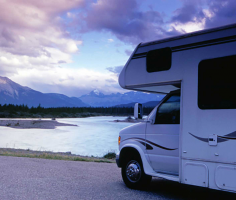— Goodyear G159 tires blowing out on motorhomes are the focus of a federal investigation involving about 40,000 tires made between 1996 and 2003.
The National Highway Traffic Safety Administration (NHTSA) says it learned of the possible dangers because of a court order that forced Goodyear to release documents to NHTSA, documents that showed injuries and deaths that were caused by G159 tires.
The government says it was unaware of the problem because Goodyear had the evidence sealed as conditions for settling lawsuits with G159 tire owners.
NHTSA says Goodyear provided documents showing 13 injuries and one death have occurred because of G159 tire failures. In addition, the government says it has received 10 complaints about failures of Goodyear G159 tires on motorhomes, with two complaints alleging the tire failures caused crashes.
"Two tires blew out within a two months period, both blowouts occured on the inner sidewall of the inside right rear tire, the tire tread was undamaged but a hole was blown in the sidewall of the tire (goodyear g159 unisteel tire size 245/70r19.5, load range f)"
Another motorhome owner told NHTSA the Goodyear G159, 225/70R22.5 tire blew out and almost caused them to lose control. But the tire blowout also caused damage to the front of the motorhome, including to the airbag.
Yet another driver says the Goodyear G159, 275/70R22.5 tire tread separated and caused the motorhome to crash into a guardrail, injuring the driver when the steering wheel jerked as the tire rim hit the ground.
And finally, the owner of a motorhome experienced two blowouts just four days apart.
"While driving on two occasions 8-4-00 and 8-8-00 the goodyear (g159 unisteel 275/70r225) tire experienced blowout causing damage to the motorhome, on the second blowout the motorhome went into oncoming traffic, no accident. Goodyear denied any responsibilities."
Safety regulators say motorhome owners complain the tires weren't designed to be used for extended use at highway speeds, the very conditions that face motorhomes across the country.
In one G159 lawsuit that goes back to a 2003 crash, (Goodyear v. Haeger), the Center for Auto Safety filed a motion to intervene so thousands of documents will reach the public, documents the Center says Goodyear has fought to keep hidden.
The Haeger lawsuit was filed after the right front Goodyear G159 tire blew out on a 38-foot-long motorhome, sending the RV crashing onto its side. The driver, 70-year-old LeRoy Haeger, allegedly required 17 surgeries until his death from cancer in 2008. His wife, son and daughter-in-law all suffered injuries in the crash, some severe.
The two sides reached a settlement agreement before the trial was scheduled in 2010, but months later, the Haegers’ lawyer learned that in another lawsuit involving the G159 tires, Goodyear had disclosed test results indicating the tires got unusually hot at highway speeds. Goodyear then admitted it withheld the information from the Haegers even though they had requested all testing data.
The Haegers went back to court and argued that Goodyear’s misconduct entitled them to attorney’s fees and costs they endured from their lawsuit. The court found that Goodyear's misconduct occurred on an extended basis, so the judge awarded the Haegers $2.7 million, which was the entire amount they had spent in legal fees and costs.
Goodyear appealed the award, but the 9th U.S. Circuit Court of Appeals upheld it, causing Goodyear to appeal to the Supreme Court. That court ruled that Goodyear couldn't be nailed with the entire $2.7 million, then sent the case back to the 9th Circuit for reconsideration.
Court documents say the tires were created to handle 194-degree temperatures at long periods of time, such as highway driving. However, plaintiffs in those cases said the tires could hit nearly 230 degrees when driving 75 mph.
Goodyear could be looking at recalling the tires, not to mention penalties involving millions of dollars if NHTSA finds the company concealed known G159 tire safety defects.
CarComplaints.com will update our website with results of the tire investigation.

